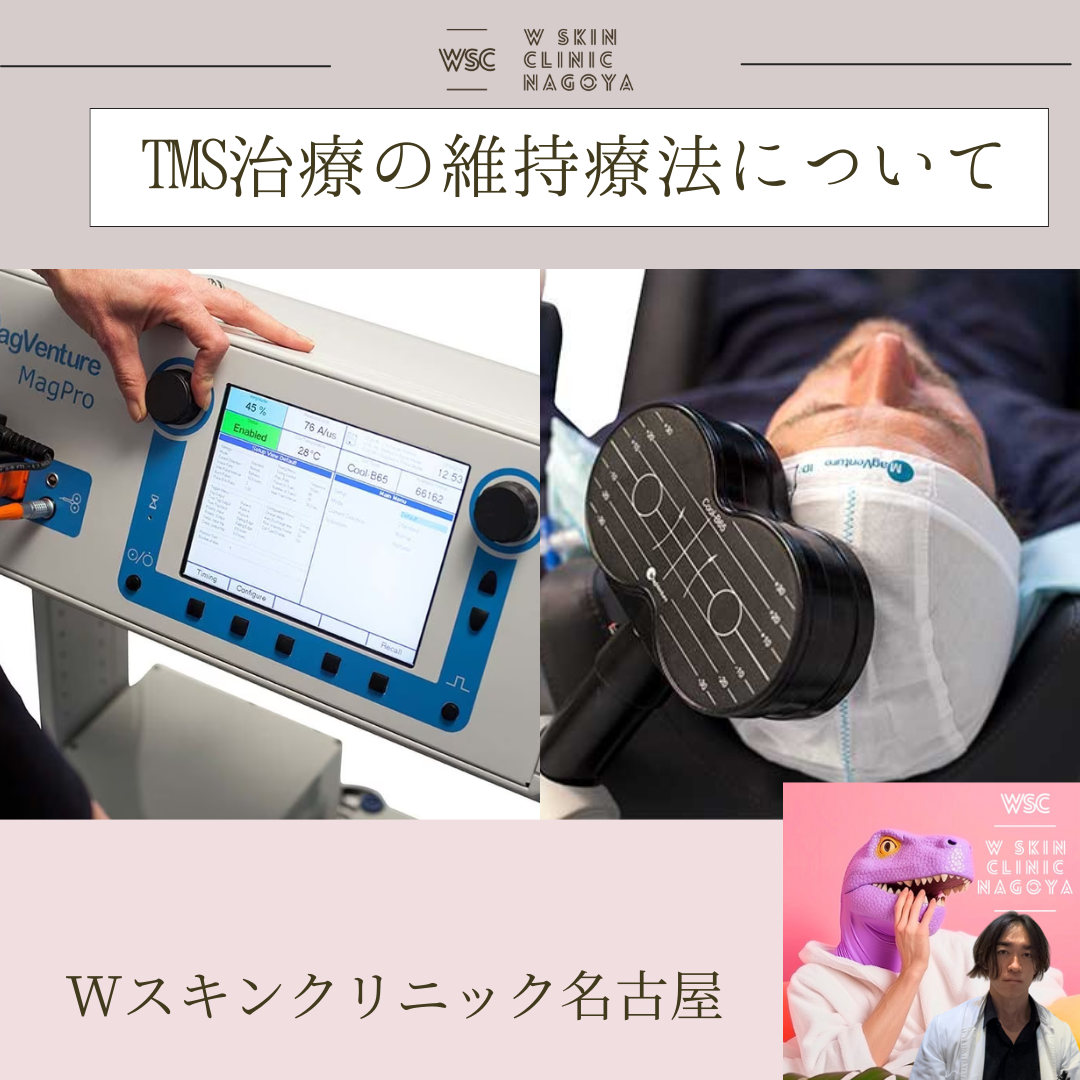NEWSお知らせ
2024.09.17|ブログ
TMS治療の維持療法について、効果はあるか?治療頻度は?根拠となる論文について、名古屋の美容皮膚科医が解説

TMS治療の維持療法について、効果はあるか?治療頻度は?根拠となる論文について、名古屋の美容皮膚科医が解説
こんにちは、Wスキンクリニック名古屋、院長の加藤晃司です。
今回は、TMS治療の維持療法について、効果はあるか?治療頻度は?根拠となる論文について解説します。
TMS治療の維持療法は、主にうつ病などの慢性的な精神疾患に対する長期的な効果を維持する目的で行われます。維持療法は、初回のTMS治療によって得られた効果を持続させ、症状の再発や悪化を防ぐために重要とされています。以下に、TMS治療の維持療法に関する効果、治療頻度、根拠となる論文について説明します。
- 維持療法の効果
①効果
TMS治療の維持療法は、特にうつ病や双極性障害などの精神疾患に対して、再発の防止や症状の悪化を防ぐために有効とされています。多くの研究では、初期のTMS治療で効果が得られた患者に対して、維持療法を行うことで、その効果が持続し、症状の再発率が低下することが報告されています。
特に、うつ病の患者において、急性期のTMS治療の後に定期的な維持セッションを受けることで、改善された症状を長期間にわたり維持できることが確認されています。
根拠
2014年に発表された**Philip et al.(2014)**の研究では、TMS治療を受けた重度うつ病患者に対して、維持療法が再発予防に有効であることが示されました。この研究では、急性期治療後、維持療法を受けた患者の大多数が1年間にわたって症状の再発を防ぐことができたと報告されています【参考論文1】。
Sackeim et al.(2020)の研究でも、長期的なTMS維持療法が、特に薬物療法が不十分な患者に対しても効果的であり、うつ病の再発率を大幅に低下させることが示されました【参考論文2】。
- 治療頻度
①急性期治療と維持療法の違い
急性期治療:TMS治療は、通常、急性期治療として週に5回、4〜6週間にわたって行われます。この期間において、患者は症状の大幅な改善を経験します。
維持療法:急性期治療の後、TMSの効果を長期間にわたって維持するために、維持療法が行われます。維持療法の具体的な頻度は患者の状態に応じて異なりますが、通常は月に1回から数回程度です。
②維持療法の標準的な頻度
多くの研究では、維持療法は週1回から月に1〜2回のペースで行われることが一般的です。初回の急性期治療で症状が劇的に改善した場合、月に1回程度のセッションで効果を維持できることが多いです。
状況によっては、患者の状態を観察しながら、セッションの間隔をさらに広げることも可能です。特に、長期間安定している患者の場合、維持療法の頻度を減らしていくことが推奨されます。
- 維持療法の根拠となる論文
論文1:Philip NS et al. (2014)
タイトル: "Maintenance Repetitive Transcranial Magnetic Stimulation for Treatment-Resistant Depression: A Pilot Study"
概要: この研究は、治療抵抗性うつ病の患者を対象に、TMSの維持療法の効果を調査しました。急性期の治療に続いて維持療法を受けた患者は、症状が改善した状態を維持し、再発率が低かったと報告されています。
結論: 維持療法を行うことで、うつ病の症状が長期にわたって改善され、再発が防止される可能性があることを示唆しました。
論文2:Sackeim HA et al. (2020)
タイトル: "Durability of Antidepressant Response to Repetitive Transcranial Magnetic Stimulation: Systematic Review and Meta-analysis"
概要: TMSの抗うつ効果がどの程度持続するかを評価するために、複数の研究をレビューし、メタ分析を行いました。急性期治療後に維持療法を行うと、うつ病の再発率が有意に低下することが確認されました。
結論: TMS維持療法は、特に薬物治療が効果的でない患者に対して、うつ病再発の予防に非常に有効であることが示されています。
論文3:Janicak PG et al. (2010)
タイトル: "Durability of Clinical Benefit With Transcranial Magnetic Stimulation in the Treatment of Pharmacoresistant Major Depression: Assessment of Relapse During a 6-Month Controlled Follow-Up"
概要: 治療抵抗性うつ病患者に対するTMSの長期的な効果を評価した研究で、急性期治療後の6か月間のフォローアップで、維持療法を行うことで治療効果が持続したことが確認されました。
結論: 急性期TMS治療後に、月1〜2回の維持療法を行うことで、うつ病の症状が改善された状態を維持できることがわかりました。
まとめ
TMS治療の維持療法は、急性期治療によって得られた改善を長期間持続させ、症状の再発を防ぐために有効です。研究では、TMS維持療法がうつ病や治療抵抗性の患者に対して、特に再発予防に効果的であることが示されています。治療頻度は月に1〜2回が一般的ですが、患者の状態に応じて調整されます。
維持療法の効果については、Philip et al.(2014)やSackeim et al.(2020)の研究が示すように、長期的な症状の管理に有用であるというエビデンスがあります。
Wスキンクリニック名古屋での、TMS治療はこちら
https://www.w-clinic-nagoya.com/tms
現在TMS治療のモニター募集しております。
ご興味のある方は、クリニックまでお問い合わせください。
Wスキンクリニック名古屋
理事長 加藤晃司
当院では無料でスタッフカウンセリングを行なっております。
お気軽にご予約くださいませ
Wスキンクリニック名古屋 (美容皮膚科)
https://www.w-clinic-nagoya.com/
〒461-0005 愛知県名古屋市東区東桜 2-4-1 第3コジマビル6F
TEL 052-7377-7117(10:00~19:00)
LINE ID @w.nagoya
高岳駅より徒歩4分 / 新栄町駅より徒歩5分
お車でお越しの方
名鉄協商パーキングチケットをお渡しいたしますので、クリニック近くのパーキングをご利用ください。
Is There Any Effectiveness of Maintenance Therapy with TMS Treatment? What is the Treatment Frequency? Explanation by a Cosmetic Dermatologist in Nagoya
Hello, I’m Dr. Koji Kato, the director of W Skin Clinic Nagoya.
Today, I will explain the effectiveness of maintenance therapy with TMS (Transcranial Magnetic Stimulation) treatment, the recommended treatment frequency, and the scientific evidence supporting its use.
Maintenance therapy with TMS is primarily performed to sustain the long-term benefits of TMS in chronic mental health conditions such as depression. Maintenance therapy is important to help prolong the effects obtained from the initial TMS treatment and prevent symptom recurrence or deterioration. Below, I’ll discuss the effectiveness, treatment frequency, and relevant studies regarding TMS maintenance therapy.
- Effectiveness of Maintenance Therapy
① Effectiveness
Maintenance therapy with TMS has been shown to be effective in preventing relapse and worsening symptoms, particularly in conditions like depression and bipolar disorder. Numerous studies have reported that patients who responded positively to the initial TMS treatment and continued with maintenance therapy experienced sustained benefits, with a reduced recurrence rate of symptoms.
In particular, patients with depression have been shown to maintain their improved condition over long periods by receiving regular maintenance sessions following acute-phase TMS treatment.
Evidence
A study by Philip et al. (2014) demonstrated that maintenance therapy was effective in preventing recurrence in patients with major depressive disorder who had undergone TMS treatment. The study reported that the majority of patients who received maintenance therapy after the acute phase were able to prevent symptom recurrence over a year【Reference Study 1】. Another study by Sackeim et al. (2020) showed that long-term TMS maintenance therapy significantly reduced the relapse rate in patients, especially in those with treatment-resistant depression【Reference Study 2】.
- Treatment Frequency
① Differences Between Acute-Phase Treatment and Maintenance Therapy
Acute-Phase Treatment: TMS treatment typically involves 5 sessions per week for 4 to 6 weeks during the acute phase. This period generally brings significant symptom improvement for patients.
Maintenance Therapy: After the acute phase, maintenance therapy is conducted to sustain the long-term effects of TMS. The specific frequency of maintenance therapy varies depending on the patient’s condition, but it is typically done once a month or several times per month.
② Standard Frequency of Maintenance Therapy
Many studies suggest that maintenance therapy is commonly performed at a frequency of once per week to 1–2 times per month. If the patient has experienced significant improvement after the initial acute treatment, monthly sessions are often enough to maintain the therapeutic effects. Depending on the patient's stability, the frequency of sessions can be further reduced over time, especially for those who remain stable over the long term.
- Supporting Evidence for Maintenance Therapy
Study 1: Philip NS et al. (2014)
Title: "Maintenance Repetitive Transcranial Magnetic Stimulation for Treatment-Resistant Depression: A Pilot Study"
Summary: This study investigated the effects of maintenance therapy in patients with treatment-resistant depression. The results showed that patients who received maintenance therapy after acute treatment were able to maintain improved symptoms and had a low recurrence rate.
Conclusion: The study suggests that maintenance therapy can sustain long-term improvement in depression symptoms and help prevent recurrence.
Study 2: Sackeim HA et al. (2020)
Title: "Durability of Antidepressant Response to Repetitive Transcranial Magnetic Stimulation: Systematic Review and Meta-analysis"
Summary: This study conducted a systematic review and meta-analysis of multiple studies to evaluate the durability of antidepressant effects from TMS. It confirmed that maintenance therapy following acute treatment significantly reduced relapse rates in depression.
Conclusion: TMS maintenance therapy is highly effective in preventing relapse, particularly in patients for whom medication was insufficient.
Study 3: Janicak PG et al. (2010)
Title: "Durability of Clinical Benefit With Transcranial Magnetic Stimulation in the Treatment of Pharmacoresistant Major Depression: Assessment of Relapse During a 6-Month Controlled Follow-Up"
Summary: This study evaluated the long-term effects of TMS on patients with treatment-resistant depression, showing that maintenance therapy over a 6-month follow-up period helped sustain treatment effects.
Conclusion: Monthly maintenance therapy after acute-phase TMS treatment helps to maintain improvements in depression symptoms.
Conclusion
Maintenance therapy with TMS is effective in sustaining the improvements achieved during acute-phase treatment and preventing symptom recurrence. Research shows that TMS maintenance therapy is particularly effective for patients with depression or treatment-resistant conditions, significantly reducing relapse rates. The typical treatment frequency is 1–2 times per month, but this can be adjusted based on the patient's condition.
Studies by Philip et al. (2014) and Sackeim et al. (2020) provide evidence that TMS maintenance therapy is useful for long-term symptom management and preventing relapse.




